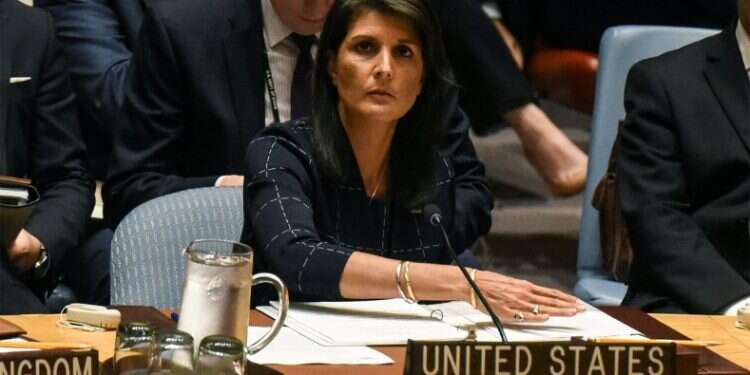The U.S. is poised to quit the United Nations Human Rights Council, activists and diplomats indicated Thursday, telling the Reuters news agency that talks with the U.S. over how to reform the human rights forum had failed to meet Washington's demands.
The Geneva forum is scheduled to open a three-week session on Monday.
Speaking on condition of anonymity, a U.S. source told Reuters the withdrawal appeared to be "imminent," but had no further details.
Diplomatic sources said it was not a question of if but rather of when the U.S. will retreat from the Human Rights Council.
A separate U.S. official in Geneva had no information about a looming pull-out during the upcoming talks, saying: "We are still moving ahead with our engagement for the coming session."
Nikki Haley, the U.S. ambassador to the United Nations, publicly told the Council a year ago that Washington might leave the body unless a "chronic anti-Israel bias" was corrected.
The forum, set up in 2006, has a permanent standing agenda item on suspected violations committed by Israel in the Palestinian territories, which Washington wants removed.
Washington says the Council is stacked with opponents of Israel and boycotted it for three years under President George W. Bush before rejoining under Barack Obama in 2009.
The 47-member forum last month voted to set up a probe into the deaths of Palestinians trying to breach Gaza's border with Israel and accused Israel of excessive use of force. The United States and Australia cast the only "no" votes. Israel's ambassador in Geneva, Aviva Raz Shechter, castigated the Council for "spreading lies against Israel."
On Wednesday, Haley lamented a U.N. resolution condemning Israel for excessive force in confronting riots and terrorist activity on the Gaza border as "totally one-sided" and said it "does nothing to advance peace between Israel and the Palestinians."
Talks held in Geneva and in New York for months could not find consensus around a new agenda, according to activists and diplomats who have taken part.
Diplomats said it could lead to Israel being even more isolated in the Human Rights Council and could bolster countries such as Cuba, Egypt, Pakistan and Russia who reject what Israel and the U.S. say is U.N. interference in sovereign issues.
The European Union failed to find a common position, mainly due to Belgium's wish to keep Israel firmly on the agenda of each session, U.S. officials said.
The United States also wants to make it easier to kick off member states with egregious rights records. Haley has cited Venezuela, China and Saudi Arabia as violating standards.
The Council has ongoing investigations into violations in hot spots including Myanmar, South Sudan and Syria, with a view to gathering evidence that could lead to future prosecutions.
Marc Limon, executive director of the think tank Universal Rights Group, said there were "rumors and mutterings" of a "political decision" having been taken in Washington to disengage.
"They could either leave the seat empty, which could happen in June, or if withdrawing, formally notify the U.N. General Assembly," he told Reuters.
Swiss Ambassador Valentin Zellweger said: "The decision by the Americans will have a profound impact on the Council. If they withdraw, we can expect significant consequences."
The United States had long played a "leadership role" in the Council, Zellweger said, adding: "Unfortunately I agree with them that not all members fulfill the [membership] criteria."




